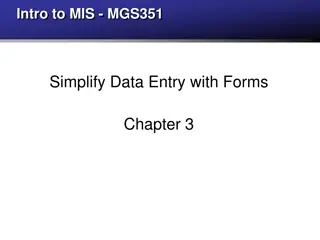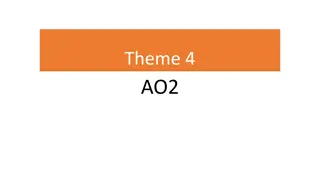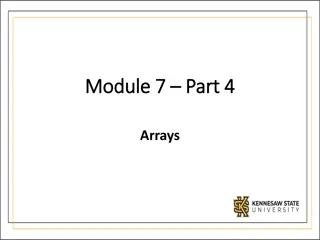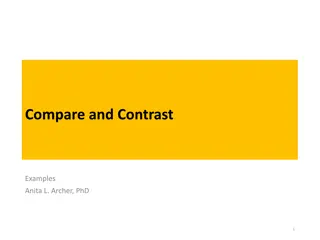Comparing Pelagian and Arminian Views on Free Will
Religious concepts of free will are explored through the teachings of Pelagius and Arminius. Pelagius emphasizes humanity's maturation in God's image and the responsibility of free will, while Arminius focuses on the denial of predestination and the role of God's grace in allowing humans to exercise free will. Both offer compelling arguments based on biblical evidence, emphasizing the importance of choice in spiritual matters.
Download Presentation

Please find below an Image/Link to download the presentation.
The content on the website is provided AS IS for your information and personal use only. It may not be sold, licensed, or shared on other websites without obtaining consent from the author.If you encounter any issues during the download, it is possible that the publisher has removed the file from their server.
You are allowed to download the files provided on this website for personal or commercial use, subject to the condition that they are used lawfully. All files are the property of their respective owners.
The content on the website is provided AS IS for your information and personal use only. It may not be sold, licensed, or shared on other websites without obtaining consent from the author.
E N D
Presentation Transcript
4D Religious concepts of free will, with reference to the teachings of: Pelagius: The role of original sin, humanity maturing in God s image and accepting the responsibility of free will, free will as used to follow God s laws, the role of grace in salvation. Arminius: Denial of predestination, the effect of original sin on free will, God's 'prevenient' grace (the Holy Spirit) in allowing humans to exercise free will, the Elect and the possibility of rejecting God's grace, the election of believers being conditional on faith.
Pelagius(354-420 CE) https://www.youtube.com/watch?v=l68-WGBQVCU
Pelagius key ideas Explanation The role of original sin Humanity maturing in God s image Accepting the responsibility of free will Free will as used to follow God s laws The role of grace in salvation.
Arminius key ideas Explanation The denial of predestination The effect of original sin of free will God s prevenient grace (the holy spirit) in allowing humans to exercise free will The Elect and the possibility of rejecting God s grace The election of believers being conditional on faith
Jacobus Arminius (1560-1609 CE) https://www.youtube.com/watch?v=CA6ZGnncXl8&list=PL2ggVdhXSiox ebariYjPJGPi5IXg0B6oI&index=18 https://www.youtube.com/watch?v=Tj6I1ycrfv0
AO2 Write detailed essay plans to the following questions, use pages 9 and 10 Religious views on free will are completely convincing. Evaluate this view Individuals have complete free choice. Evaluate this view
How convincing are religious views on free will AO2 Lines of argument The Bible says we make choices! Both Pelagius and Arminius offer convincing arguments for free will on the basis that there is biblical evidence to support the idea that humanity is supposed to be free. For example: 2 Corinthians 9:7 says Since they hated knowledge and did not choose to fear the Lord. Only belief in free choice can counter complacency! Reward/punishment only makes sense with choice! The Christian teaching about Heaven and Hell, as an eternal reward or punishment makes more sense if people have chosen God or rejected him freely rather than if God has marked people out independently from their will or actions. Otherwise we may ask what the purpose is of reward or punishment? Choice and not predestination is a better fit with a loving God! Pelagius and Arminius offer a view of God that is much more consistent with his classical characteristics of being omnibenevolent and just. Original sin and Augustinian or Calvinist doctrines of the elect make God the author of sin and allow him to be arbitrary or partisan in his delivery of punishment. Both Pelagius and Arminius could be accused of picking and choosing a Biblical basis avoiding placing weight on the passages that suggest predestination. Both Pelagius and Arminius could be seen as rejecting God s omnipotence since they give the power for our ultimate end to humanity as well as God. The doctrine of double predestination claims to take the entirety of scripture seriously. This was recognised early in the Christian church with Augustine and, later by Calvin.
Key questions that may arise could be: 1. Does the Bible assume that we are free to make decisions? 2. Are the traditional attributes of God (omnipotence, etc.) more compatible with freewill or predestination? 3. What features do Pelagius and Arminius include in their theories that agree with scripture? 4. Is there anything in Pelagius / Arminius views that goes against scripture or church teaching? 5. Is the idea of a loving God more compatible with having to make free choices in a difficult world or with having those choices made for us? Possible conclusions to some arguments put forward could be: 1. Pelagius has a convincing view of free will for human beings because his theory reflects the human experience of being free to choose, and directing our own lives, whilst at the same time allowing for God s authority to reward and punish people for their moral decisions. 2. Arminius is convincing in his views on free will because he allows for a form of predestination that is consistent with the Bible (foreknowledge), whilst accepting that punishment and reward require us to take responsibility for our actions and our own faith in this life. 3. Neither one of the religious views on free will are at all convincing because they emphasise human control and remove any real need for the central role of Christ in human salvation. God is relegated to the back seat, and this is unacceptable in Christian theology.
The extent to which an individual has free choice AO2 Lines of argument Pelagius bases his position of free choice on the belief that humans are created innocent with the potential to do good or evil. This corresponds with our sense that babies are indeed innocent and that they are not born in an evil state. However, in a fallen world we are heavily influenced by the habits of others and so it is easy to sin. For Arminius, humans do not have free will after the fall they need God s grace, which comes through faith. However, they are able to make choices in terms of developing their spiritual lives. Without this belief, we would be passive and not develop in holiness. Predestination was never accepted in any major, early creed of the church. This seems to indicate that, even though Christianity believes in the importance of Grace and Faith, that choice-making is a part of the Christian path. Pelagius has all people born innocent of sin. However, if we listen to modern scholarship we know that children learn from external influences. This means that the innocent child learns to sin from their surroundings. This means that they can never really be considered free to make their own choices. If God has chosen who to save us before the foundation of the world, it does not make sense to call our choices free. Scripture clearly states that we are predestined e.g. Romans 8:28-30 says For those who he foreknew, he also predestined to be conformed to the image of his son. Therefore we must not have free choice.
Key questions that may arise could be: 1. Is Arminius right about free choice if God knows what we will do in advance? 2. Are infants truly innocent and undetermined? 3. What is the role of Grace in the thinking of Pelagius and Arminius? 4. What do most Christian churches officially teach on this subject? 5. Do Pelagius / Arminius theories conform to our human experience? 6. Do Pelagius / Arminius theories conform to scripture? Possible conclusions to some arguments put forward could be: 1. Human freedom of choice is supported by both Pelagius and Arminius and their appeal to Scripture and the plain sense of applying reward and punishment to only free human beings. 2. Human beings are not entirely free both Pelagius and Arminius recognise the power for sin and the need for Grace and forgiveness. In the case of Arminius, the power of sin is such that we cannot come freely to God, though after receiving God s grace we can make choices about how to best grow in holiness. 3. Belief in God s omnipotence and omniscience is simply not compatible with freedom of choice. It is theologically compelling to see god as the creator of evil and therefore to see humans as passive and helpless in their sin and their salvation.























